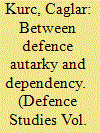| Srl | Item |
| 1 |
ID:
153711


|
|
|
|
|
| Summary/Abstract |
Turkish defence industries have significantly improved their production capabilities since the 1980s. According to the official documents, Turkey reached 54% local production level in 2011. Encouraged by this impressive defence industrial development, the government of Turkey declared that defence industrial autarky, the country’s main goal since the 1980s, would be reached by 2023. This paper evaluates the possibility of Turkey’s defence autarky. Contrary to the existing approaches in the literature that assess technological capabilities and cost-effectiveness, this paper argues that Turkey’s search for defence autarky is hindered by the interplay of institutional deficiencies, dependency on foreign inputs, and the United States’ continuing influence over Turkish politics.
|
|
|
|
|
|
|
|
|
|
|
|
|
|
|
|
| 2 |
ID:
162501


|
|
|
|
|
| Summary/Abstract |
Coordinating defence-industrial relations towards harmonising and facilitating procurement policies, production processes and the joint operability of their member-states’ national defence sectors, International Armaments Organisations (IAOs) play an important role in armaments cooperation. How can we explain their institutional development? Existing literature tackles this question using International Relations theories to mid-range theories of institutions and integration. However, they adopt overly state-centric viewpoints, assume actor interests as given, and disregard the changes in the global economic landscape that constitute the backdrop of armaments cooperation. In response, we shift the focus onto a key group of actors: the defence firms. Using a Neo-Gramscian Historical Materialist approach, we investigate how the globalisation of the defence market has created a transnational defence-industrial class in Europe, and demonstrate how its economic interests have fundamentally shaped the institutional frameworks of European IAOs. We focus on the Organisation for Joint Armaments Cooperation (OCCAR) and the European Defence Agency (EDA) to illustrate our argument. Our conclusions have implications for the study of armaments cooperation, particularly highlighting how the economic nature of this policy domain necessitates a closer look at the global and regional production relations, and the agency of the defence firms.
|
|
|
|
|
|
|
|
|
|
|
|
|
|
|
|